| Clutching My Pearls is my ongoing blog series about my take on Jane Austen’s beliefs and ideas, as based on her novels. Click here for the introduction to the series. |
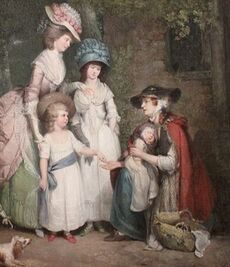 Lady and her children relieving a cottager
Lady and her children relieving a cottager First though, I'll start with what might appear to an irrelevant diversion. But it’s important because it undergirds everything I’ll be saying about Austen and her times.
When discussing (or condemning) the attitudes and actions of people who lived two hundred years ago, there is one crucially important thing to keep in mind, and it is summed up in this chart which shows global gross domestic product from 0 BCE to the present day.
Before the industrial revolution, as economist Carl Benedikt Frey explains, "For the majority of the English as late as 1813, conditions were no better than for their naked ancestors of the African savannah. The Darcys were few, the poor plentiful."
But GDP leaped up like a rocket with the advent of industrialization...
Most people’s lives were taken up with working to obtain adequate food and shelter. When Britain led the way with mechanization and free trade, look what happened.
For the first time, people could travel by train, faster than a horse could gallop. For the first time, ships were not at the mercy of the winds. For the first time, people had gas lighting as an alternative to candles. As wealth grew, slavery and serfdom decreased. The British government devoted considerable resources to patrolling the seas around Africa and suppressing the slave trade.
The impression we get from those rollicking Regency cartoons with their fat squires and fat ladies is that England was a land of plenty and security. But half of the poor people in the world today enjoy comforts and luxuries and security that a Regency duke couldn’t have dreamt of. Light at the flick of a switch. Running hot and cold water. Clean, efficient sewage systems. Air conditioning and central heating. Cars, trains, airplanes. Antibiotics and painkillers. Life-saving surgery. Fresh vegetables and fruits from all over the world, year round. Public schools and the internet.
If you’re rolling your eyes and saying, “yeah I know, I know” – that's great!
On the other hand, if you don’t know much about the British Empire and colonialism and the Great Divergence, I'm not going to accuse you of not wanting to know about poverty and slavery and people of colour. That’s not where I am going with this. I am laying the foundation for a discussion of the way Austen and her fellow Britons looked at the world.
And of course, there were a variety of opinions in Austen’s day—they were not monolithic in their thinking any more than we are today. In fact, the more I read about this period, the more I am struck by its resemblance, politically, to our present times.
So I’ll be referencing that chart of prosperity more than once, to ground us in Austen’s world. For example, consider the wages of sin in Austen’s time. In a society with a slender margin between survival and death, it only makes sense that hard work, sobriety, and chastity were stressed. People were not shielded from the consequences of their actions.
Also, I’m going to revisit Jane Austen, the Secret Radical, which I’ve already written about, but I find there is more I want to say and fact-check!
So now that we've laid the foundation, let's lay down some basic postulates.
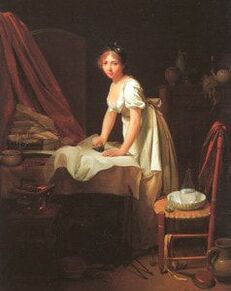 Boilly, Young Woman Ironing, about 1800-03
Boilly, Young Woman Ironing, about 1800-03 Secondly: Let's postulate that if Austen endows a character with likeable qualities, and they occupy the space in the book typically occupied by the hero, (they marry the girl at the end), it is safe to assume that this person is the hero.
Thirdly: Let’s postulate that these good, likeable people have opinions which reasonable people of Austen’s time would agree with. Good people are respectful to their parents and elders, for example, and bad people aren’t—this is consistent across Austen’s six novels.
Lastly: If Austen puts an opinion into the mouth of one of her fools or villains, this also tells us about her own opinions. It’s pretty clear she is opposed to uncharitable, selfish people, by her portrayal of John Dashwood and his dreadful wife Fanny in Sense & Sensibility. Two men who make proposals of marriage (Henry Crawford and Mr. Collins) are guilty of not taking ‘no’ for an answer, of not viewing women as ‘rational creatures.’ Isabella Thorpe is a complete hypocrite. Austen prizes sincerity.
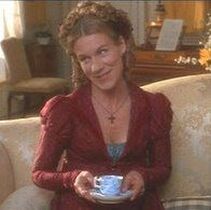
My argument is that Austen was not a secret radical. I think she was an abolitionist, yes. But she didn’t crusade for an end to the slave trade in her books. Of course we can’t help thinking about the slave trade as we read Mansfield Park. When I wrote my Mansfield Trilogy, the issue of the slave trade became an integral part of the plot--how could it not? It is uncomfortable, to say the least, to read about the domestic problems of a family who live off slave labour. Compared to the nightmare that was life on a sugar plantation in Antigua, the hardships Fanny suffers, the persecutions of Aunt Norris are trifling, they are as a drop of water to the ocean. That’s the context in which we now read this book. But we bring that to the text, not Austen. If you think Mansfield Park is about slavery, I disagree, and I'll explain why later.
In future posts, I’ll be discussing the novels, reacting to some post-modern interpretations of Austen and giving my reasons for thinking that Mansfield Park is about education (not slavery), Sense & Sensibility is about self-control (not primogeniture), Emma is about self-deception (not land enclosure), and Pride & Prejudice is not about class overthrow.
Next post: Secret Radical Redux
| The difficult, dangerous campaign of the West African Squadron is featured in my Mansfield Trilogy. As well, the writer William Gibson tries to champion the cause of the Luddites, the poor working-class weavers who were losing their livelihoods due to the new steam-powered mills which were replacing hand weaving. Click here for more about my novels. |

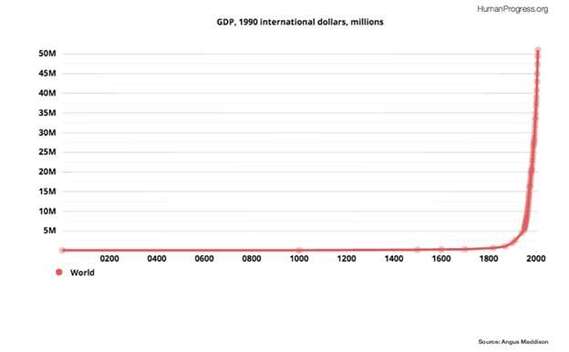
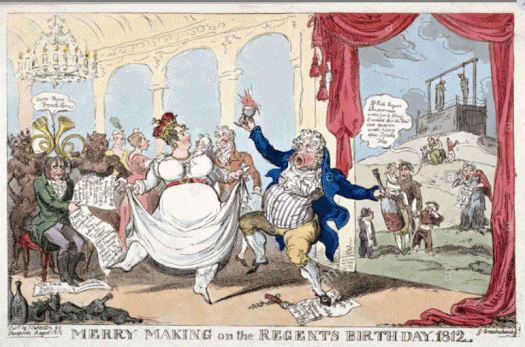
 RSS Feed
RSS Feed